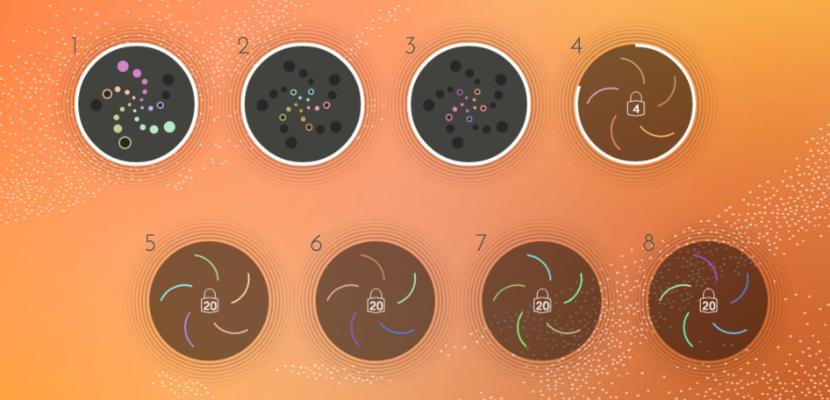What strikes me first about the online music-learning app Meludia is that it doesn’t tell me precisely what to do. The six initial exercises are arranged in a circle so I’m not sure which one to start with—but the order doesn’t matter. Moreover, the one-sentence instructions before each game are so brief I am not sure I know exactly what they mean—but I quickly pick up their meaning while playing. (Don’t worry, you can watch a tutorial video if you prefer more guidance.)
This minimalism makes perfect sense for an interface like Meludia, since its approach is to teach through intuition rather than music-theory jargon. Through a system of colorful bubbles, pleasing geometric designs, and encouraging messages, I learn to listen more closely to the subtle differences in chords, melodies, and rhythms. And differences is the key word, because with the Meludia method, it’s all relative: in most exercises, there is no traditional musical notation or keyboard to follow. So, for example, in one game, I simply had to listen for the relative interval between notes, without knowledge of the initial note.
What’s so interesting about this lack of emphasis on musical terms and notation is that anyone—whether they read music or not, whether they have studied music theory or not, whether they have even played an instrument or not—can use Meludia. All that’s required is a computer or tablet, internet access, and some good speakers or headphones. Meanwhile, the app’s advanced- and expert-level exercises provide challenges to even professional musicians. No matter what your level, visual dashboards showing your progress and strengths make it satisfying to continue playing and improving.
And where does all this get you as a pianist? As CEO Bastien Sannac puts it, spending time on Meludia can “improve the way that you process music in your mind. This leads to your acquiring the so-called ‘inner keyboard,’ which will allow you to internally hear the exact music that you are going to play and create beforehand. This is what being a musician is all about.”
Sannac, a pianist, singer, and composer, built the online application after studying under renowned French music teacher Vincent Chaintrier, who originally developed the Meludia Method. The website launched in 2014, and includes a few free exercises to start with; there are subscription fees to continue with additional exercises. A special platform for educators allows them to get group access and track their students’ progress.
Whether you are already practicing piano, taking music lessons, researching pieces you are learning, or studying theory, Meludia offers an additional way to strengthen your understanding of classical music. The application is remarkable in that it transforms something that’s normally intangible—acquiring the skill of deep listening—into a series of measurable activities.





Thank you for your wonderful article – this has motivated me to want to explore the Meludia app.
Excellent! Good luck with your exploration of the app and your piano practice.
I think I will try this as my music brain needs connections and this sounds like it might do it. thank you
Geraldine, good luck with the app!